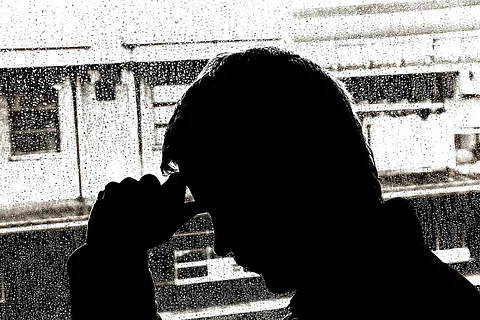

Thirty-year-old Manish* had just recovered from COVID-19 more than two months ago. Even though he had to remain in hospital for a few days and was only mildly symptomatic, he was unable to go to work even after his mandated two weeks’ quarantine period was over. “He said he was feeling low and afraid. He did not feel like working. He had initially developed a mix of anxiety and depression. Later he went into severe depression and stopped going to work altogether,” Dr Rajani P, Deputy Director, Mental Health, Karnataka Department of Health and Family Welfare, told TNM.
Manish is not alone. Several persons who have fully recovered from COVID-19 still experience anxiety, post-traumatic stress disorder and other mental health issues post their recovery. “A lot of them have developed anxiety and depression even though previously they did not have any mental health issues,” she said. Dr Rajani explained that Manish, a low-mid income group professional, faced chronic stress over taking care of his children as he was the sole breadwinner for the family. “Often we see chronic stress can lead to reduction of serotonin levels and this can lead to biological depression and anxiety. So these people have to seek professional help. Maybe only 30% of people recovering from COVID-19 who face mental health issues may need to seek out professional help and there should not be any stigma surrounding this,” she emphasised.
“While for Manish, the reason was apparent, there is no definite pattern for us to detect vulnerable patients. I have interacted with many patients myself and especially youngsters who have recovered from COVID-19 but even though they were not severely affected physically, they went into severe depression or developed chronic anxiety,” Dr Rajani noted.
Unlike Manish, Dr Ranjani said Venkat* a 33-year-old man who had a stable white collar job and was admitted in a reputed private hospital developed severe post-traumatic stress disorder. “For him the issue was he would unconsciously remember vivid details of his time in the hospital, even though there was no specialised procedure required to treat him. He would remember his time in the hospital where he would check his blood oxygen saturation himself and feared if he would require artificial oxygen supply. And now, he fears getting reinfected and whether he will be able to survive,” Dr Ranjani added. Multiple health experts have pointed out that the chances of reinfection are very rare.
Post-COVID-19 mental health illness is a common pattern emerging now say experts as we near nine months into the pandemic. Early into the pandemic the Karnataka government had set up mental health helpline and counselling protocols for all COVID-19 patients admitted in all government hospitals.
Dr Ranjani urged patients to seek mental health help at the slightest instance given that prolonged stress can trigger complex and compounding issues of anxiety and depression which can be prevented with timely intervention. She said people in general should seek help as soon as they feel suicidal, anxious, have recurrent negative thoughts or feel their efficiency has suddenly reduced.
While persons who can afford treatment can choose to go to both private and public healthcare setups, she said low-income group populations should walk into any government hospital for free mental healthcare.
“If anybody feels uncomfortable to walk into hospitals, they can call 104 and press 4. The state government has also started the esanjevani platform where people can seek professional help. This is an unprecedented situation, it is important to seek help and it. It is absolutely okay not to feel okay,” she said.
Dr Ranjani said for most patients counselling alone works as a remedy while few may need mild doses of medicine. Both Venkat and Manish are back to leading their normal lives within two weeks after professional intervention.
Dr H Chandrashekahar, Head of Department of Psychiatry, Victoria Hospital, said at a single time at least 30 individuals among the 500+ COVID-19 patients will need some help with addiction issues and other mental health issues like anxiety, depression and delirium state. “A state of confusion, low confidence, insomnia, panic is common among patients of the post-40 age group after their recovery. On the other hand, anxiety and depression is common among young patients,” he told TNM. He said for most of these patients we have to continue video counselling post their discharge as we want to minimise contacts owing to the pandeic.
Another challenge that mental health care professionals are addressing in this pandemic are issues related to substance addiction among COVID-19 patients. “We had a patient who had suddenly stopped taking alcohol post his recovery and he started experiencing fits as part of his withdrawal symptoms. So we had to start him on anti-craving medicines and his liver condition also had to be managed. But we were able send him home within three days,” Dr Chandrsekhar recounted.
Dr Chandrasekhar said for these patients the treatment follows the usual protocol of counselling and medication as and when required.
(*name changed)